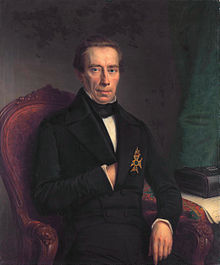Johan Rudolph Thorbecke
|
His Excellency Johan Rudolph Thorbecke |
|
|---|---|

Portrait by Johan Heinrich Neuman, 1852
|
|
| 3rd Prime Minister of the Netherlands | |
|
In office 4 January 1871 – 4 June 1872 |
|
| Monarch | William III |
| Preceded by | Pieter Philip van Bosse |
| Succeeded by | Gerrit de Vries |
|
In office 1 February 1862 – 10 February 1866 |
|
| Monarch | William III |
| Preceded by | Schelto van Heemstra |
| Succeeded by | Isaäc Dignus Fransen van de Putte |
|
In office 1 November 1849 – 19 April 1853 |
|
| Monarch | William III |
| Preceded by | Jacob de Kempenaer |
| Succeeded by | Floris Adriaan van Hall |
| Minister of the Interior | |
|
In office 4 January 1871 – 4 June 1872 |
|
| Preceded by | Cornelis Fock |
| Succeeded by | Pieter Philip van Bosse |
|
In office 1 February 1862 – 10 February 1866 |
|
| Preceded by | Schelto van Heemstra |
| Succeeded by | Johan Herman Geertsema Carelszoon |
|
In office 1 November 1849 – 19 April 1853 |
|
| Preceded by | Jacob de Kempenaer |
| Succeeded by | Gerlach Cornelis Joannes van Reenen |
| Member of the House of Representatives | |
|
In office 25 February 1868 – 4 January 1871 |
|
|
In office 19 November 1866 – 3 January 1868 |
|
|
In office 14 March 1866 – 1 October 1866 |
|
|
In office 27 June 1853 – 31 January 1862 |
|
|
In office 17 October 1848 – 31 October 1849 |
|
|
In office 21 May 1844 – 19 October 1845 |
|
| Personal details | |
| Born |
Johan Rudolph Thorbecke 14 January 1798 Zwolle, Netherlands |
| Died | 4 June 1872 (aged 74) The Hague, Netherlands |
| Nationality | Dutch |
| Spouse(s) | Adelheid Solger (m. 1836–1870; her death) |
| Children | 4 sons and 2 daughters |
| Alma mater | Leiden University (Master of Laws, Master of Letters, Master of Theology, Doctor of Philosophy, Doctor of Letters) |
| Occupation | Politician, civil servant, jurist, historian, professor, author |
| Religion | Lutheran |
| Signature | |
Johan Rudolph Thorbecke (14 January 1798 – 4 June 1872) was a Dutch politician and statesman of liberal signature, one of the most important Dutch politicians of the 19th century.
In 1848 he virtually single-handedly drafted the revision of the Constitution of the Netherlands, giving less power to the king, and more to the States General of the Netherlands.
Thorbecke was born in Zwolle. His father Frederik Willem was a Lutheran tobacco manufacturer of German descent, while his mother Christine Regina was born in the Lower Saxon Osnabrück. Frederik Willem's business suffered badly from the anti-British policies of the French occupiers, and his tobacco factory went bankrupt in 1803, after which he was unable to find another source of employment and would spend most of his time on the education of Johan Rudolph and his younger brother. Johan Rudolph proved to be diligent and exemplary at a young age, showing intelligence and curiosity. Because of the sacrifices of his parents, who continued to struggle with financial problems, he was able to enjoy decent education. He enjoyed primary education in his birthplace and in Amsterdam, where he lived until 1806, and attended a Latin school back in Zwolle until 1814. Thorbecke began studying classical literature and philosophy in Amsterdam, studies he finished in Leiden defending a thesis on Asinius Pollio in 1820.
Shortly after his promotion, Thorbecke was granted a state scholarship for a journey through Germany. At Giessen he lectured as an extraordinary professor, and at Göttingen, in 1824, published his treatise, Ueber das Wesen der Geschichte. He would spend four years travelling, during which he was introduced to historism and Romanticism, and developed emotionally and spiritually. Upon his return to the Netherlands in 1824, he settled in Amsterdam, where he wrote his first political work of significance, Bedenkingen aangaande het Regt en Den Staat ("Objections anent Law and the State"). The work managed to catch attention, and Thorbecke became professor of Political Science at Ghent University the following year, a position he was forced to resign from due to the Belgian Revolution in 1830. The following year, Thorbecke became professor of Diplomacy and Modern History at the Leiden University, where his students would describe him as a distant, analytical mind, living a secluded life in his study.
...
Wikipedia
